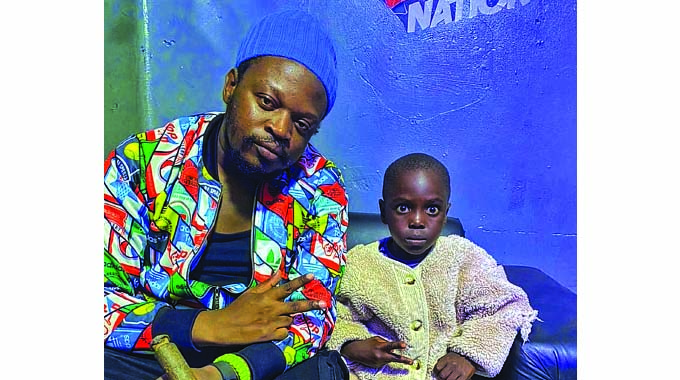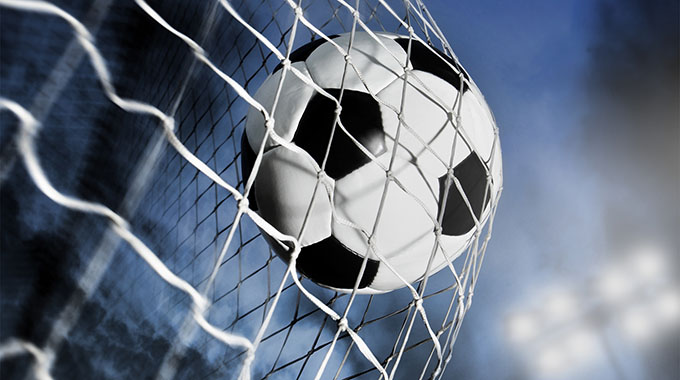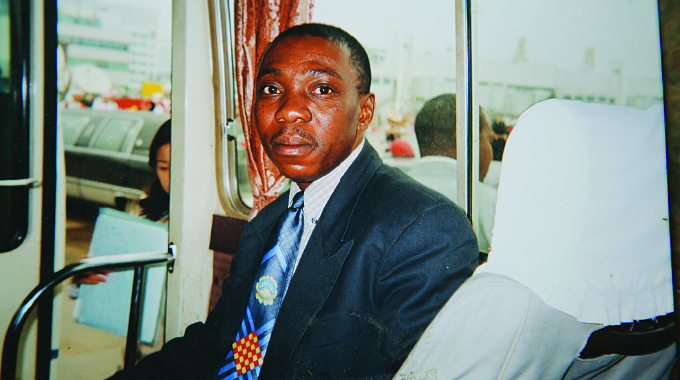KAKATOWANDAAA, it’s so amazing

Sharuko On Saturday
A VIDEO, a simple amateur recording, a boy, a simple ghetto lad, a conversation, a simple discussion about football.
The setting isn’t spectacular, the background tells a story — one of poverty, one where nothing is given and everything has to be earned.
But, for all its poverty, it’s a place exploding with riches.
An area with a very rich history when it comes to this country — it’s football, its boxing, its music, its leaders, its heart and its soul.
Its houses provided a home for the budding talents which would transform themselves into some of domestic football’s stars.
Its dusty streets provided a playground, and a theatre, they honed their skills, as mere little boys just powered by their dreams.
At House Number 26, along Fourth Avenue in National, used to live a boy who, with the passage of time, would transform himself into a star Peter Ndlovu called the GOAT.
Everyone called him The Mastermind, a nickname which spoke volumes about his genius, on the football pitch.
George Shaya, a man who will forever be associated with local football, a name which will forever be associated with brilliance, was 77, when he passed away, in August last year.
His mother, Gogo Fransisca Shaya-Kashukware, still lives today.
A proud woman who, even as old age begins to take its toll, still vividly recalls the days her magical son used to torment his opponents, in their street football battles.
If George was the greatest of them all, there were a sizable number of others, from this productive hub, who were also very, very good.
Chitsere Primary School still stands today, as much an iconic landmark of the famous suburb, as Rufaro itself.
It used to be the school of a one-armed terrier, who was quite a very good footballer, his amazing skills helped him make a mockery of his disability.
Along the way, he wrote his name into domestic football folklore.
They called him ‘Dusty King’, his real name was Freddy Gotora.
“A man called Freddy Gotora or ‘Dusty King,’ as he was affectionately known, was at one time described as the best number eight on the continent,’’ David Mungoshi, the late author, poet and actor, once wrote in this newsroom.
“Gotora went to Chitsere Government School in Mbare, where his football prowess first showed. That was also the place where something happened to make him lose half of his left arm.’’
It’s like there is always an expectation that something special will always come out of Mbare.
It has always been the case for years – be it in music, in football, in boxing, science, in leadership, in just about every sector one can think of.
After all, this used to be the home of Elizabeth Maria “Mai Musodzo” Ayema, a social worker who left a huge imprint in the fabric of Mbare’s society.
This year marks the 70th anniversary of her death, in 1952.
But, even though more than half-a-century has passed, this community has never forgotten its great daughter.
Her place, among the immortals from this great suburb — the likes of Jack Bakasa, Canaan Chipunza, Samuel Sondo and Adam Chigwida — is firmly secure.
This year, their proud home, is marking the 115th anniversary of its establishment in 1907.
Heroes come in all shapes and sizes in Mbare and, in the ‘80s, it was the home for an athlete who became the African heavyweight boxing champion.
His name was Proud Chinembiri, everyone called him Kilimanjaro.
He was huge, which explains his nickname, he was also called the Man Mountain.
KAKATOWANDAAA, THE SOCIAL MEDIA SENSATION
In sharp contrast, the latest buzz coming from Mbare is being generated by a tiny six-year-old Grade One pupil at Nharira Primary School who, overnight, has become a social media sensation.
The football-crazy boy, the star of those amateur videos, which have become an instant hit on the internet.
His name is Ngedwa Mpako!
He is a typical Mbare boy — he comes from a poor family, where his hardworking mother helps the family earn a living by selling vegetables.
Predictably, he loves football, both as a player and a spectator, and it’s something that runs in the DNA of these boys from Mbare.
And, he is pregnant with ambition, a boy determined not to let the poverty, in which he is growing up, to derail his dreams of one day becoming a star himself.
He is a devoted fan of Cristiano Ronaldo.
And, in his world, powered by both the innocence of his youth, the beauty of imagination and the poison of bias, Lionel Messi is not a great football star.
Of course, we all know Ngedwa is wrong, very wrong, but while his extreme bias blinds him from reality, his amazing knowledge of the game has captured our imagination in a very big way.
There is something just different about this boy, if he doesn’t blow you away with his passion for the game, he seduces you with his passion to back his argument, no matter how flawed it is.
The way he rolled his eyes, and tilted his head to a certain angle, to hammer home his point that Messi used to score, from almost halfway down the pitch, during his days at Barca, is pure box office theatre.
His friend thought he had just thrown in the joker, to dismiss his praise of Ronaldo scoring from outside the box, by suggesting Messi used to even score from the halfway point of the field.
But, Ngedwa, as always, had a response, saying those were the days of a bygone era, when the Argentine superstar used to play for Barca.
And, for good measure, he reminded his friend, it’s something Messi used to do with amazing regularity and, as they say it in Shona, “KAKATOWANDA”.
The way he pronounces this word, complete with gasps here and there, rolling eyes, a tilted head, to close the argument, provides a conclusion which not many seasoned film producers would have struggled to come up with.
I am one of the thousands of people who have been swept away by the magic of this amazing Mbare boy.
We all tend to fall in love with budding stars, especially those from tough backgrounds, from underprivileged communities, from poor families.
We develop a special attachment with them, praying that their talent lifts them from their circle of poverty into a world where they can live the life of their dreams.
That’s why Peter Ndlovu appeals to all of us because he is just a boy from Makokoba who used the talent, which God gave him in abundance, to take himself to the Promised Land of the English Premiership.
His humble beginnings, growing up in a big family, which had limited means, provide us with a reminder that, as that Adidas advert keeps telling us, ‘IMPOSSIBLE IS NOTHING.’
For the past 32 years, the Flying Elephant’s story has provided many of our boys, from similar tough backgrounds, to dream big and pursue their adventure to use their football talent, to chase their dream of a better life.
Benjani Mwaruwari grew up in such poor surroundings in Magwegwe but ended up being a footballer which Portsmouth would pay a then club record £4.1 million to bring him into the Premiership.
Along the way, he ended up playing for Manchester City.
Maybe, in more ways than one, little Ngedwa sees a lot of similarities between Cristiano Ronaldo and himself, which explains why he is so crazy about the Portuguese superstar.
Some will find it crazy that a poor boy from Mbare, who survives from what his mother earns selling vegetables at the market, would even dare to find any similarity with an icon like Ronaldo.
A 37-year-old global superstar with a net worth of about US$500m, with an endorsement deal with Nike worth over US$1 billion, who owns a US$25m private jet and a stretch of private land on his home island of Madeira in Portugal.
A superstar athlete who drives a US$300 000 Lamborghini Aventador, a US$360 000 Rolls Royce, in a collection of supercars which also includes the Bugatti Centodieci, Bugatti Chiron, Bugatti Veyron and the Ferrari F12 TDF.
A personal collection of flashy cars worth about US$30 million.
A man who has a $6,2 million villa in La Finca, an exclusive community in Madrid built by architect Joaquin Torres and an $18.5 million apartment in Manhattan’s Trump Tower.
A man who now wears a US$160 000 Jacob and Co watch and who owns a chain of hotels.
Why should someone like poor Ngedwa, who doesn’t even have a guarantee that there will be meat in the dinner mum will provide for the family this evening, even dare dream of becoming someone like Ronaldo one fine day?
THERE IS NO CRIME IN DREAMING BIG
The beauty of life is that no one can tell us what tomorrow will look like, no one can predict who will live, or die, tomorrow and who will succeed or fail.
That’s why today’s Ronaldo, and yesterday’s Cristiano, are people from two vastly different worlds.
Yesterday’s Cristiano didn’t have it all like the Ronaldo we have today.
And, just like Ngedwa, he was just a boy growing up in a very poor family in San Antonio, the poorest neighbourhood of Funchal, the capital of Madeira.
His mother Dolores was a cook while his late father Dinis was a mere gardener who also had a serious addiction, when it comes to alcohol.
It didn’t help that the horrors of war, as a Portuguese soldier fighting in Angola for the empire, against the locals who needed their Independence, left him scarred for life.
He was a man haunted by the past and he probably had a feeling he would find an escape, from all this, in the arms of alcohol, especially when taken to excess.
“He was drunk almost every day. I never really knew him well. I would have liked him to have been around more,” recalled Ronaldo’s mother.
For Ronaldo, his siblings and mother things got so desperate home became a single room, which they all shared.
And, it was common for him to beg for burgers outside the McDonald’s shop in the area.
“We were a little hungry. We have a McDonald’s next to the stadium,” said Ronaldo. “We knocked on the door and asked if they had any burgers.
“There was always Edna and two other girls, I never found them again.”
His mother even revealed she contemplated terminating her pregnancy, because she just could not understand how she could provide for an extra child, when Ronaldo was conceived.
“He is a child that I wanted to abort,” she said. “God didn’t want that to happen and I was blessed because of that and God didn’t punish me.
“Sometimes Ronaldo makes fun of me and says ‘you didn’t want me to be born but now you see that I’m here helping all of you.’
“And, well, sometimes we have a laugh about that.”
We haven’t seen Ngedwa in action, which even, to some people, makes the whole idea of writing about him, as someone with a potential to one day make the grade, even in Division One, such a ridiculous exercise.
It’s even foolish, some will rightly argue, to spend all this space including his name when we are talking about legends like Cristiano Ronaldo.
But, Ngedwa has a dream.
The same dream Strive Masiyiwa had when he mooted the idea of establishing Econet Wireless, with many saying he was too ambitious and would be humbled, or even swallowed, by an industry which looked a complex one.
Today, he is a billionaire businessman.
The same dream Tongayi Arnold Chirisa had when he started appearing as Detective Trevor Davies in “Studio 263”, with many saying he was too ambitious and would be humbled, or even swallowed, by an industry which looked a complex one.
Today, he is shining in Hollywood, the theatre of dreams for all actors, in the City of Angels.
Ngedwa’s passion to excel in football has already seen him join an academy in his neighbourhood even though his frame suggests he could, if he succeeds, become someone closer to Kante than Ronaldo.
No one can blame him for trying, for dreaming, for being on the right path and, more importantly, for not having the love for the game, a sport he believes will pluck him out of his ghetto.
If there is a disappointment for me, in his story, it’s the reality that it tends to suggest he doesn’t have any local role models and his knowledge of the game is about European football, rather than the domestic game.
We can’t blame him for that!
Instead, we should be asking ourselves why our boys now want to be a Ronaldo or a Messi and why there aren’t enough local role models for them, anymore?
In my street football team, I used to call myself David Mwanza because he was our local hero, the Chakariboy who had risen to play for the Warriors.
It’s a privilege our boys don’t have any more, which means that for many, just like Ngedwa, comfort, and hope, is now being found in the foreign players.
I like Ngedwa, if not for his football skills, which I’m yet to analyse, then for his love of our game.
His knowledge of the game is just amazing, his attachment to it is just mind-blowing, his romance with it is just at another level and there is no need for us to ask him how many times he practices with the ball.
We already know the answer — “KAKATOWANDAAAA.”
To God Be The Glory!
Peace to the GEPA Chief, the Big Fish, George Norton, Daily Service, Sitting Bull, Crazy Horse and all the Chakariboys still in the struggle.
Come on United!!!!!!!!!!!!!!!!!!!!!!!!!
Ronaldoooooooooooooooooooooo!
Text Feedback 0772545199
WhatsApp 0772545199
Email- [email protected]; [email protected]
You can also interact with me on Twitter (@Chakariboy), Facebook, Instagram (sharukor) and Skype (sharuko58) and GamePlan, the authoritative football magazine show on ZTV, where I interact with the legendary Charles “CNN” Mabika, is back every Wednesday night at 9.30pm











Comments